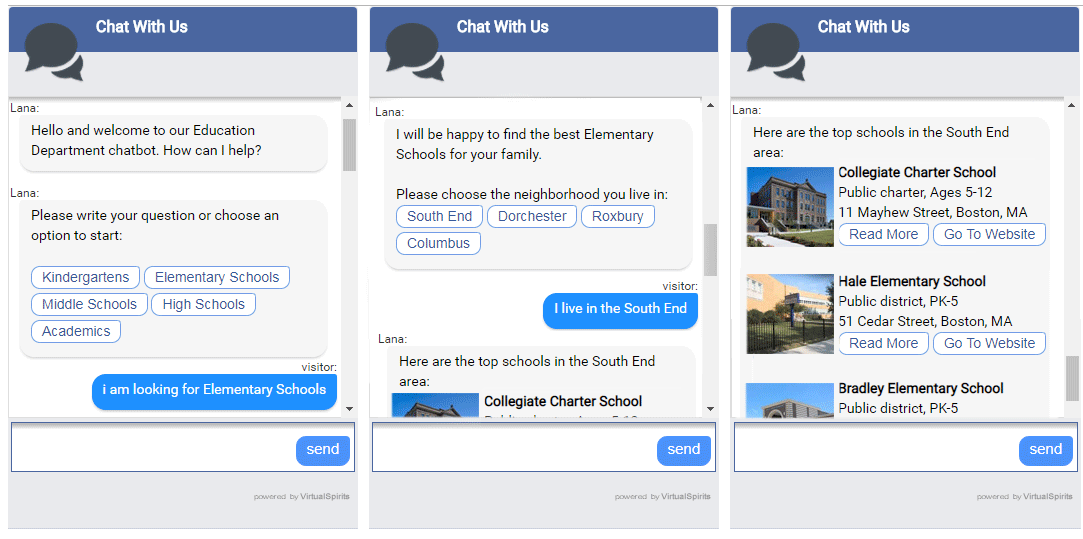
TOPICS:
Chatbot for Government Chatbot for Service Building a chatbot
Government chat bots: 4 examples of how government agencies use chatbots
It doesn’t take too many guesses to figure out how online chatbots help the likes of ecommerce businesses or travel agencies. But when it comes to government chat bots, things get a little more ambiguous. Do government agencies really need chatbots?
Let’s answer that question through some examples of how government bodies are beginning to use government chatbots.

1. Chatbot as virtual public health assistant:
Picture the website of a city’s public health department, based on how you remember it from 10 years ago. Numerous mundane webpages, containing information about diseases, emergency and first aid measures, tables with contact details of the city’s hospitals, scheduled health drives and check-up camps, and so on. For the average citizen, the sheer volume of information would be hard to process, and the website wouldn’t really invite them to venture into all those details.
But when these very public health department websites start building government chatbots, things start looking rather different.
Instead of navigating to a webpage on hospitals, a visitor can just ask the chatbot,
“How do I contact [Hospital Name]?”Or, they can get the contact details of all the hospitals in their vicinity by typing,
“Can you give me a list of hospitals in [Area name]?”Similarly, important information and circulars on disease awareness and emergency protocols can now be offered to the citizens via chat. This way, citizens don’t have to put in the effort to educate themselves about what to do in case of a medical emergency. The government chatbot can take the initiative and guide the citizens.
Public health departments can further refine this functionality to create a virtual medical service that citizens can talk to while they wait for a medical professional to attend to them. For instance, after calling for paramedics when someone in the family complains of chest pains, one can check with the public health chatbot whether the patient is doing the right breathing exercises and taking the right precautions while they wait for help to arrive.
2. Chabot as virtual staff for the Department of Motor Vehicles:
The Department of Motor Vehicles usually wins the popular vote for the slowest and most tedious of all government offices. With government chatbot development, however, that opinion can change pretty quickly.
So what do online chatbots do for a city’s DMV? Well, basically everything that is repetitive and simple, and doesn’t require the physical presence of the applicant or the DMV’s staff. The bulk of the DMV’s work involves repetitive tasks like issuing and renewing driving licenses, license plates, and parking permits. Most of these formalities can be initiated, or even completed, online. The best chatbots for DMV websites make paperwork simple and straightforward for citizens. For example, license renewals can be initiated in just a few steps, from any computer or mobile device at any hour of the day.
Citizen:
“I want to renew my license.”Chatbot:
“Sure thing. Please give me your license number, so I can fetch you the renewal form.”The citizen enters their license number.
Chatbot:
“Thanks! Please follow the link below to fill out and submit the renewal form. I’ll be right here if you have any questions.”The citizen fills out the form, uploads the documents required, and submits the application.
Chatbot:
“Great, your application is submitted! Your acknowledgment number is [ticket ID]. You can use it to check the status of your application, here or at the DMV. Is there anything else I can help you with?”3. 24/7 online customer support:
If a quick online chat is all that people need to do to get the information they need about public services in their city, they won’t be queuing up outside government offices or holding up their phone lines. Armed with online government chatbots, civic bodies can offer an extremely efficient customer support desk, where citizens can get instant and accurate answers to basic questions such as:
“When does the public pool open?”“Which roads will be blocked during tomorrow’s rally?”“How do I register for the housing lottery?”“Can I get next year’s public school calendar?”With chatbots at work, government agencies don’t need to allocate precious manpower to handling these basic and repetitive queries. This frees up their resources for other more important aspects of civic administration.
4. Collecting feedback from citizens:
Answering citizens’ questions is just one side of the picture. When government bodies create a government chatbot for their websites, they’ve already established an effective point of contact with the public. This allows them the option of collecting public feedback about their schemes and policies right through the online chat window. It’s no secret that successful government policies are those that are built around the needs and preferences of the people. With the help of online chatbots, governments can get detailed insights into what the public thinks, and the changes it would like to see in the city.
Prompts for public feedback can be built into various parts of the chat script. For example, when a citizen is about to finish talking to an online chatbot on the tax authority’s website, the bot can say,
“Glad I could help you. Would you help us out by taking a quick 2-minute survey about your experience with the website?”Or, when a citizen is browsing local events on a city government’s website, the government chatbot can ask,
“Hi, are you happy with the cultural events and activities in [City]? We’d love to hear your thoughts in this 2-minute survey.”We started out by asking whether government agencies really need chatbots. The answer to that question will of course be subjective, but the above examples show that governments can dramatically improve their communication with citizens by building government chatbots for their websites. And better communication leads to a more engaged and involved public, which is the foundation of any successful city.
Have questions about chatbot development for government agencies and other industries? Feel free to reach out!